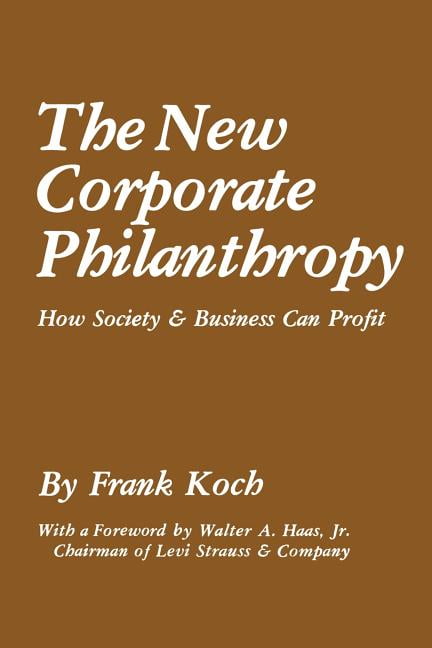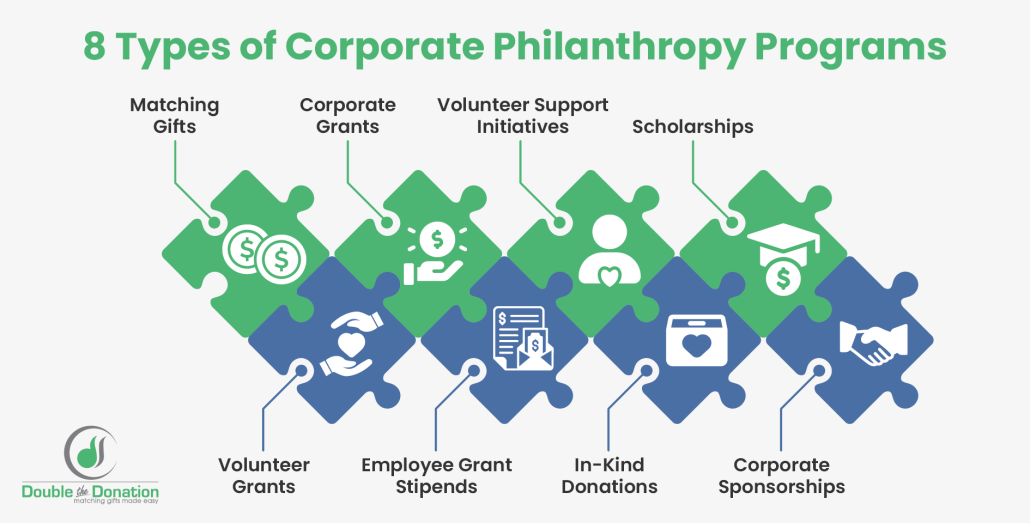Why Business Philanthropy Issues: An Overview to Company Social Obligation
Company philanthropy offers as an important component of corporate social obligation. It reflects a business's devotion to social concerns and boosts its public image. Businesses participating in kind initiatives commonly see boosted staff member spirits and stronger community connections. Nevertheless, real influence of these efforts can be multifaceted and intricate. Recognizing the subtleties of business philanthropy can brighten its relevance in today's service landscape. What are the critical factors that drive its success?
The Definition of Business Philanthropy
Business philanthropy refers to the philanthropic payments and efforts embarked on by companies to support social reasons and community development. This principle includes a range of tasks, consisting of monetary donations, staff member volunteer programs, and in-kind gifts of services or products. Firms participate in philanthropy to resolve social issues such as education, health treatment, ecological sustainability, and poverty alleviation.
Generally, business philanthropy is structured via formal programs or partnerships with not-for-profit organizations, permitting services to take advantage of their sources efficiently. These campaigns usually aim to make a positive effect on the neighborhood while lining up with the firm's worths and goal. Furthermore, business philanthropy mirrors a dedication to corporate social duty, showcasing how services can add to society beyond revenue generation. By participating in humanitarian initiatives, business can play a significant function in fostering social change and dealing with community needs.
Benefits of Business Philanthropy for Companies
Engaging in corporate philanthropy offers various benefits for businesses, enhancing their credibility and fostering more powerful neighborhood ties. Business that proactively take part in humanitarian initiatives commonly experience enhanced staff member morale and loyalty. When staff members view their company as socially accountable, they are extra likely to really feel pleased of their office, resulting in higher degrees of task contentment and retention.
Business philanthropy can create important networking opportunities. Teaming up with non-profits and area companies enables services to link with similar people and groups, potentially bring about collaborations that can benefit both celebrations. In addition, companies participated in philanthropy might locate themselves a lot more attractive to capitalists and stakeholders who focus on ethical practices.
Ultimately, business philanthropy not just supports societal demands yet also supplies tangible advantages to organizations, creating a win-win scenario that advertises growth and sustainability while adding positively to the world.
Enhancing Brand Commitment Via Social Obligation
Enhancing brand loyalty through social responsibility involves building depend on with consumers by aligning corporate activities with neighborhood worths (corporate philanthropy). Business can cultivate much deeper connections with neighborhood interaction initiatives that reverberate with their target audience. Furthermore, authentic brand storytelling can additionally strengthen commitment by showcasing authentic commitment to social reasons
Building Depend On Via Activity
Structure trust fund through activity is an effective method that business can carry out to reinforce brand commitment and foster much deeper connections with consumers. When businesses actively involve in corporate philanthropy, they show a dedication to ethical practices and social responsibility. This positive approach not just improves their track record however likewise reverberates with consumers that focus on values alignment. Transparency in philanthropic initiatives is important; companies should effectively interact their campaigns and the influence they are making. Credibility plays a considerable duty also; customers are more probable to support brands that genuinely respect societal issues instead of those that engage in surface advertising. Inevitably, by focusing on purposeful activities over mere words, firms can nurture enduring depend on and loyalty among their consumer base.
Neighborhood Engagement Initiatives

Genuine Brand Name Narration
Neighborhood involvement campaigns typically work as a structure for authentic brand storytelling, which plays a substantial duty in growing brand loyalty. By sharing authentic stories concerning their social obligation efforts, business can attach mentally with consumers. These tales highlight the brand's values, goal, and commitment to social renovation, promoting trust and relatability. When consumers perceive a brand name as socially accountable, they are more probable to create a much deeper fondness and choice for it. Authentic storytelling also encourages transparency, inviting consumers to engage with the brand on an individual level. As a result, services not just improve their credibility but also build long-term connections with their target market, inevitably resulting in boosted commitment and campaigning for in an open market
The Role of Employees in Company Philanthropy
Workers play an important role in shaping a firm's philanthropic initiatives through their involvement and participation. Efficient employee interaction techniques can boost volunteerism, causing significant area effect. As companies harness the collective energy and enthusiasm of their labor force, they can cultivate a society of considering that extends beyond the office.
Employee Interaction Strategies
Involvement in business philanthropy promotes a sense of function that prolongs beyond mere profit-making. Business can enhance staff member participation by executing different techniques that motivate participation in philanthropic campaigns. One efficient approach is to develop a matching gift program, where the company matches staff member donations to eligible charities, amplifying their effect. In addition, routine interaction regarding kind initiatives can produce understanding and inspire employees to add their time and sources. Moreover, providing systems for staff members to share their philanthropic interests fosters a sense of ownership and neighborhood. Identifying and awarding staff members for their kind contributions can likewise reinforce a society of providing, eventually resulting in a much more involved workforce lined up with the business's social responsibility goals.
Volunteerism and Area Impact
Business philanthropy grows when individuals proactively participate in volunteerism, straight influencing the neighborhoods they offer. Worker involvement in volunteer efforts not only improves company culture but additionally promotes a feeling of objective and link amongst staff. With volunteering, employees try this out establish necessary skills, such as teamwork and leadership, which can convert right into boosted job performance. Furthermore, when workers unify for community triggers, they strengthen their bond with the company, improving total spirits and commitment. Organizations that urge volunteerism typically see a positive public photo, as area engagement shows their dedication to social responsibility. Inevitably, the cumulative influence of employee volunteer efforts can change areas, dealing with pressing social concerns while enhancing business values and mission.

Determining the Effect of CSR Initiatives
As companies significantly purchase business social obligation (CSR) efforts, understanding their effect comes to be necessary for assessing performance and directing future initiatives. Determining the influence of CSR requires a diverse strategy, including both measurable and qualitative metrics. Secret performance indications (KPIs) such as area engagement degrees, staff member complete satisfaction, and ecological enhancements supply important understandings into the outcomes of CSR programs. Surveys and interviews with stakeholders can reveal the social change produced by these campaigns, while information evaluation assists track progression versus established objectives.
Straightening CSR goals with service purposes enhances accountability. Organizations can use frameworks such as the International Reporting Effort or the UN Sustainable Growth Goals to systematize their measurement procedures. Ultimately, accurate assessment of CSR initiatives not only shows a company's commitment to social obligation yet also educates technique adjustments to take full advantage of positive influence, promoting a society of sustainability and neighborhood involvement.
Ideal Practices for Implementing Reliable CSR Strategies
Carrying out reliable CSR techniques calls for a clear understanding of a company's worths and objectives, assuring alignment with stakeholder assumptions. Effective companies start by performing a detailed assessment of their social, ecological, and economic influences, enabling them to recognize locations for improvement. Stakeholder engagement is essential; organizations ought to actively include workers, consumers, and community members in the growth and execution of CSR initiatives.
Openness is another ideal practice, as it fosters count on and accountability. Firms ought to connect their CSR purposes and development freely, sharing both challenges and successes. In addition, integrating CSR into the core company technique boosts its effect, making it a fundamental component of operations as opposed to an afterthought. Normal examination and adjustment of CSR initiatives, informed by stakeholder feedback and altering social needs, assurance significance and efficiency. By sticking to these practices, organizations can produce sustainable and purposeful CSR approaches that reverberate with their communities.
Frequently Asked Inquiries
Just How Can Local Business Join Business Philanthropy?
Small companies can take part in business philanthropy by donating a percent of revenues, funding neighborhood events, partnering with nonprofits, using worker volunteer days, and taking part in social work activities, fostering a positive effect and improving their brand name track record.
What Prevail Misunderstandings Regarding Company Philanthropy?
Typical false impressions about business philanthropy consist of the belief that it's only a marketing device, that only big companies can take part, which it does not have genuine impact. Numerous underestimate the value tiny organizations can contribute with resource purposeful interaction.
How Do Consumers Perceive Business Participated In Philanthropy?
Customers commonly see companies participated in philanthropy favorably, linking such initiatives with business obligation, moral behavior, and community support. This perception can enhance brand name loyalty, influence purchasing decisions, and enhance total business online reputation in the marketplace.
Exist Tax Benefits for Organizations Associated With Philanthropy?
Organizations associated with philanthropy typically delight in numerous tax obligation benefits, such as deductions for charitable payments. corporate philanthropy. These rewards can improve a business's economic standing while promoting a positive public image with their neighborhood engagement initiatives
Can Corporate Philanthropy Improve Worker Retention Rates?
Business philanthropy can boost staff member retention rates by fostering a feeling of objective and belonging amongst team. Engaged staff members, aligned with firm worths, are a lot more likely to remain completely satisfied and dedicated within their functions.
Company philanthropy serves as an essential element of business social duty. Corporate philanthropy refers to the philanthropic contributions and campaigns undertaken by companies to sustain social causes and neighborhood development. In addition, company philanthropy reflects a commitment to company social obligation, showcasing exactly how organizations can that site contribute to society past revenue generation. Involving in company philanthropy deals numerous benefits for services, improving their online reputation and fostering stronger area connections. Consumers commonly watch companies involved in philanthropy favorably, connecting such initiatives with business duty, honest behavior, and community assistance.